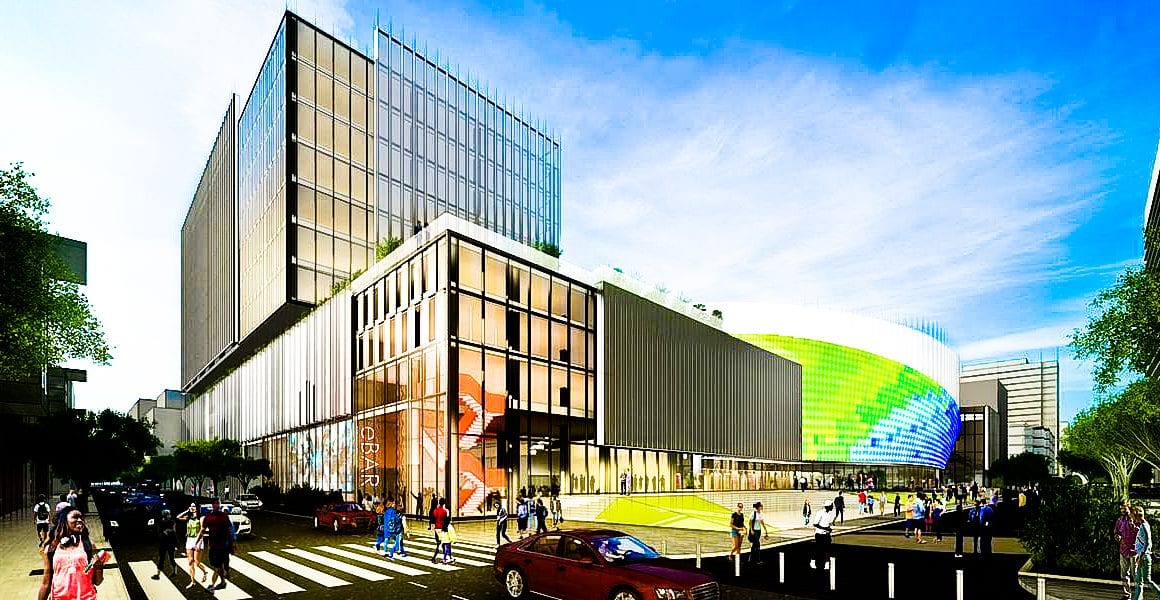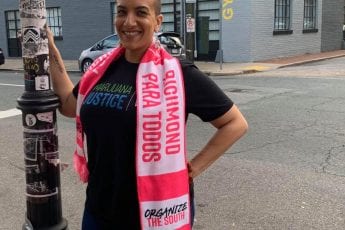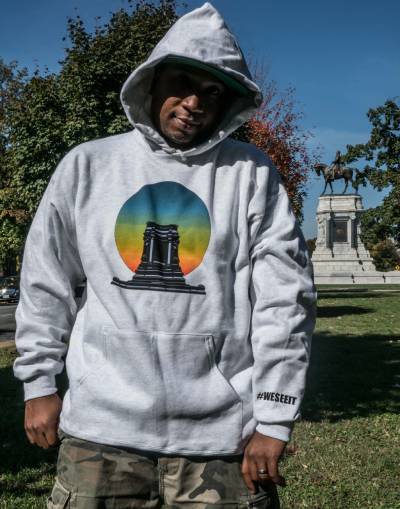BLACK RICHMOND NEEDS MORE OWNERSHIP FROM THE NAVY HILL PROJECT…LET ME EXPLAIN

Yes, the headline is also the grand conclusion of this article. I could of soften the lead a little by saying, “As of now, Black Richmond needs more ownership opportunities from the Navy Hill project” but as I understand where we are in the process, (Update: the Navy Hill Development Advisory Commission report was just released yesterday.) I am under the impression that the negotiation period is over and there is little to no more wiggle room for minor changes, let alone the type of changes I would like to see guaranteed to increase the opportunities for Black Richmond.
At this time, allow me to give the general disclaimer that I give before every Navy Hill conversation I’ve had over the last year or so: I would like to see progress in the city. I am not opposed to a new coliseum. Personally, I think we desperately need one (throw in a new baseball stadium while we’re at it – we need it). I am not anti-capitalism or anti-business, in fact, I would like to see more Black Richmonders have opportunities to increase their personal income and generational wealth. From my perspective, the Navy Hill project was not “dead on arrival” or without merit. I have been, and continue to be, open to all plans that will improve the economic opportunities for Black Richmond, increase Richmond housing stock for low-income families, increase funding for Richmond Public Schools, increase public transportation throughout the region, and raise more families out of poverty and on a path to prosperity. (okay, disclaimer over.)
Nowadays, I find myself asking the question: What will be the result of this project be for Black Richmonders in 50 to 100 years?
And that is where I struggle to support the current Navy Hill project.
As it stands right now, the financial risk will lie mostly with the bondholders due to the fact that the bonds are non-recourse and the unconventional (and I use that word loosely) financial structure of the plan.
The Navy Hill Project utilizes tax increment financing (TIF) to pay back the bonds first over the course of 30 years. (The formula does pose the risk of the City being asked to bail out the project from the general fund but the City does not have to do that)
TIF is complicated and there are plenty of experts, more knowledgeable than me, to review the pros and cons so I will not do that here only to say that I agree with those that say, as the current plan is written, the city of Richmond takes on little financial risk if the project fails to meet its economic goals. That is not to say that the project doesn’t present risks to the general fund and school funding – especially in the short term while the bonds are being paid (see the Commission Report’s comments).
To be completely honest, my concern is not: What will happen if the project fails?
I’m struggling with: What will happen if the project succeeds?
Since Emancipation (Yes, I went there — slavery in Richmond – go figure) Black Richmond has been trying to figure out the magic formula to level the playing field with White Richmond. And we’ve tried it all: protest, riots, politics, business, – all which since the 1800s have got us here.
Where is here? I’m glad you asked:
- Black Richmonders make up nearly 50% of the city’s population (white people 40%, LatinX 6.5%).
- Politically, Black people hold the office of the Mayor (Levar Stoney) and 4 of the 9 elected City Council seats (Kim Gray, Ellen Robertson, Cynthia Newbille, and Michael Jones).
- Over 25% of city residents live in poverty, nearly twice the national average.
- Approximately, 30% of Black Richmonders live in poverty.
- Richmond has held the second-highest eviction rate in the nation at 11%. High eviction rates are disproportionately found in African American communities.
- 40% of children in Richmond grow-up in poverty. High poverty rates are disproportionately found in African American communities.
- According to the RPD, Black Richmonders are disproportionately charged with violent crimes and also are the victims of violent crime in the city.
- Although black entrepreneurship is on the rise nationally and in Richmond, black founders are still receiving less VC funding than their white peers and have limited access to capital.
I could go on but I believe you understand my point. Black Richmond is still behind when it comes to economic fairness and quality of life in the city. If “economic fairness” is too vague a term for you, allow me to be even more transparent: I want to see Richmond on a path where Black businesses can gain ownership and benefits on a scale equal to White Richmond businesses. I would like to see city-sponsored development deals where Richmond’s Black Business leaders are at the table from the beginning and there are guarantees that an equitable number of contracts and city spending will be earmarked for Black businesses.
My current understanding of the Navy Hill project is that the advantages for Black Richmond are in job creation (9,300 once construction is complete) which there are no contractual guarantees for black hiring.
Affordable housing (480 units), which a studio could cost you $1,180 a month and two-bedroom $1,811 per month. Middle-income Richmonders can’t afford these prices, let alone low-income.
Future funding for RPS. I agree with NH Corp, if the project works as designed, there will be a significant long-term win for RPS in the general fund. However, I understand that there may be a short-term funding shortage while the bonds are being paid off due to the TIF. Long-term, RPS should win if the revenue projections are met. (I’m not going to get into if the numbers are real – there is enough information for you to make your own decision).
And then there is the big one: Opportunity for minority business. Navy Hill Corp. has stated the project will invest more than $300 million in minority-owned businesses, making it the largest investment in minority business in Richmond history. That sounds amazing but here are my questions:
- How is minority-owned business defined? Minority Business – A business at least 51% of which is owned and controlled or 51% minority-owned and operated by minority group members or, in case of a stock corporation, at least 51% of the stock is owned and controlled by minority group members as defined by the City of Richmond. Minority group members are citizens of the U.S. who are African-American, Hispanic-American, Asian-American, and American Indian.
- Of minority-owned business, how much is invested in black businesses? Navy Hill legally cannot say or earmark.
- $300 million is great but how much will be invested in non-minority-owned businesses? It’s a 1.2 billion-dollar project. The expressed commitment is for minority businesses is 30%.
It is my understanding that there are contractual guarantees for bondholders and developers. And that is proper; big risk means big rewards. But Black Richmonders make up 50% of the city’s population, the city-wide elected Mayor is Black, 4 of the 9 elected city council officials are Black, and Black Richmond is still fighting this perpetual uphill battle for equality, so I ask:
Can Black Richmond get contractual guarantees that the Navy Hill project will begin to dismantle the cycle of racial imbalance in ownership that has plagued our city since Emancipation?
I’ve discussed the Navy Hill project with more than a few friends and I’ve come to the conclusion that Navy Hill is offering Black Richmond what I call the “Floyd Mayweather deal.” What is the Floyd Mayweather deal? I’m so glad you asked. Mayweather, the greatest money earner in the history of boxing, would dictate the financial terms of all of his later fights by offering his opponents more money than they ever earned before – meanwhile, Floyd would walk away with historic financial figures.
For example, he may offer a fighter $3 million flat for a championship fight and Floyd would finish the night with anywhere from $25-30 million (and the championship belt). Now that $3 million is more than his opponent has ever made before in his life so everyone walked away happy – but the Floyd Mayweather deal doesn’t do much to help even out the imbalance of the system. Black Richmonders have to determine if they are willing to walk away from historic investment. These decisions are extremely difficult when Black Richmond seems to have zero to very little leverage in the process, right?
The truth is that it’s hard to build “One Richmond” when we haven’t combined the many. And we failed to acknowledge the reality that one faction has had a historical head-start that hasn’t been corrected.
While I understand the case for reparations, I don’t see national reparations as a practical solution. Black Richmond’s reparations need to be in deals like Navy Hill, but if these deals do not dramatically shift the racial imbalance of ownership in favor of Black Richmonders, Black Richmond should demand more.






 The Cheats Movement is dedicated to hip-hop culture, politics, and community activity. We see our community different than most, therefore, #WESEEIT
The Cheats Movement is dedicated to hip-hop culture, politics, and community activity. We see our community different than most, therefore, #WESEEIT
We just finished an almost year-long project with the New Hill Development Corporation in Charlottesville’s historic Starr Hill/Vinegar Hill neighborhoods — which were decimated by urban renewal. It’s a more ambitious, but significantly smaller, project than Navy Hill, and is built around the historic Jefferson School (built to serve as Cville’s segregated high school for back students), about 50 remaining homes, and a 10 acre developable lot. (See the final plan here –> https://www.newhilldev.org/starr-hill)
Two guiding principles for the future development that are absolutely invisible in Richmond:
A MORE EQUITABLE COMMUNITY: We are committed to leveling the economic and social playing field in the Charlottesville community. We envision a neighborhood where those who are often marginalized are empowered to congregate and co-create, build and own, and innovate and learn.
PROMOTE BLACK PROSPERITY: We will create strong pathways for African Americans in Charlottesville to thrive and grow. We envision a neighborhood centered around Black-owned property, commerce and culture with visible access to capital and financing.
We need to bring this sort of boldly stated intentionality to development in Richmond. Building more crap to make fewer people more wealthy is a loser’s game (unless you’re the one walking away with the wealth, I guess). Thanks for putting words on paper, Cheats.